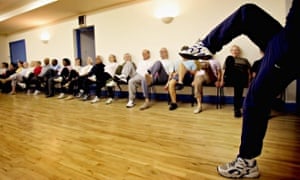'No one would attempt to generalise from birth to 40, or 40 to 80, so why generalise about “the elderly”?'
參考翻譯

Sod 70! I hate being one of 'the elderly' but not for the reasons you may think
Problems arise from attempts to describe the ageing population as a single...
THEGUARDIAN.COM
Problems arise from attempts to describe the ageing population as a single entity because of the huge age range

I am now one of “the elderly” and I hate it. Not being 70, I hasten to add – I am very glad to be in reasonable health after a life punctuated by polio, acute renal failure and a heart attack, but I hate the term “the elderly”.
Problems result from any attempt to describe the ageing population as a single entity because of the huge age range, from 65 to 105. No one would attempt to generalise from birth to 40, or 40 to 80, so why generalise about “the elderly”?
What groups can we distinguish within this huge age range and how should we refer to them, to us? The use of a single attribute is fraught with danger because people defined by one thing differ from one another in many more ways than they are similar. The image of older people, epitomised in the dreadful road sign, is about health and disability, but poverty is an equally defining feature, so we could talk about older people dependent on social security and those who have other sources of income. Even millionaires, however, have health problems, which become more common as the years increase, not necessarily as a result of biological ageing, but because of disease, much of it preventable, and loss of fitness.
A key concept in distinguishing one subgroup now is frailty, recommended by the British Geriatric Society to be used as a noun rather than the adjective frail. Frailty is not only the presence of multiple conditions, often including dementia, but a state of vulnerability in which rapid deterioration can be triggered by a small event. This group is usually described as being dependent but which of us, of any age, is not dependent on others?
There are older people with frailty, usually in their late 80s or older, and people who are not frail who play a key role in society. If people in their 70s, particularly women, gave up helping their family, friends and neighbours, the NHS would collapse. They could do even more if we realised the potential of their talents and they did not underestimate their ability because of prevailing social attitudes and the exaggeration of the effects of ageing.
Both people with frailty and those without it will eventually join another subgroup – those who are in the last weeks or days of life. There is growing concern about inappropriate treatment in the last weeks of life. This is partly due to the lack of people who have prepared an advance directive or an advanced care plan – a clear statement of what one wishes if the end is near but you are no longer able to communicate or make decisions.
In all this debate, there is one fact that cannot be denied – chronological age. Even if we remember that people of a certain age differ from one another in many more ways than they are similar, generalisations can be made. Let’s celebrate the fact that four out of five people now make it to 70, but they cannot just put on their slippers and coast, they have to take action. If everyone from 60 upwards takes action to become fitter, reduce the risk of disease and reverse the negative stereotypes that pervade society, many of the problems of the 80s and 90s can be prevented or postponed. We can increase healthspan without increasing lifespan but only if we think harder about the different groups within the 40 years from 65 to 105. Down with “the elderly” and up with living well and dying well whatever your age.
Sir Muir Gray is author of Sod 70! The guide to living well
沒有留言:
張貼留言